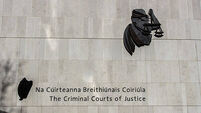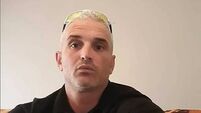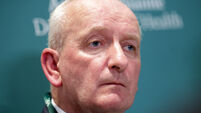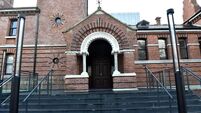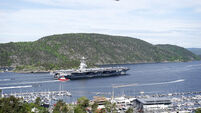Dear Sir... Readers' Views (18/06/16)

I was flicking through the stations the other night and one politician appeared on the RTÉ Archives that brought an immediate sense of nostalgia to the screen.
It featured Neil T Blaney, a magnificent orator who had experience and a strong conviction in his beliefs, which he had inherited from his father Neal, who had been a commander of the IRA in Donegal during the War of Independence.
When Neil was first elected as a TD to Dáil Éireann in 1948, he was pioneering in that he brought cavalcades and roadside bonfires as part and parcel of celebrating victory at the polling booth.
Neil formed Independent Fianna Fáil after he was kicked out of Fianna Fail by Jack Lynch in 1972.
Neil and Charlie Haughy were accused of making money available to buy guns in which Captain James Kelly (Irish Army) and Belgian businessman Albert Luykx were tried in court as their co-accused — all were found innocent of the charges. As I was watching the programme, I got a phone call from Joe Curran from Ray. Joe told me that he was in Paris following the Irish soccer team and that he had visited a street in Paris named La Rue Bobby Sands, after the hunger striker who died in 1981.
The coincidence of this piece of information supplied to me by Joe i from Paris, was that Neil had canvassed for Bobby in the Fermanagh South Tyrone by-election where Bobby was elected to Westminster as he lay on his death bed.
While the country of his birth left it to other foreign countries to name streets in his honour, it seems the heroic Bobby’s death in the H-Blocks of Long Kesh was deemed not important enough to name anything after him by successive Irish governments.
Throughout his life in politics, Neil never faltered in his support of the republican narrative of Green, White, and Orange as one island and one people. But at least this one rural Fanad Republican has a road named after him in his home county of Donegal, the Neil T Blaney road in Letterkenny.
The Blaney name ‘was’ synonymous with republicanism down through the years and there was an alliance between Independent Fianna Fail and Sinn Féin on Donegal County Council.
Neil’s brother Harry was a county councillor and good friends with the two Sinn Féin councillors on the council, Liam McIllhney and Eddie Fullerton, who was murdered in front of his wife and family in the family home in Buncrana by the UDA, who were directed and financed by the murky indiscretions of British security forces, via the use of double agents.
Just as Bobby Sands was not deemed important enough to have a road or street after him in his home country, neither was Eddie Fullerton’s murder deemed important enough by the State — where he was born, worked and served the community — to carry out a proper investigation into his death.
What a pity there is no Sráid Baille named Bobby Sands or an RTÉ programme highlighting the truth, the whole truth, and nothing but the truth surrounding Eddie’s tragic death. At least Eddie’s legacy is alive and well in the name of the Fullerton Pollen Dam in Buncrana.
an Choirce
na
I read with interest Colin Nevin’s letter (14/06/16) on the Jewish festival of Pentecost/Shavuot, and fully support his call to recognise and reclaim the Jewishness of Jesus and the Jewish origins of the Christian faith.
On one point, however, Mr Nevin seems to be in error. He claims that Easter is merely “a man-made tradition, named after a pagan deity, Ishtar”, with no Jewish connections. Perhaps he has been led astray by the name. It is an oddity of English (and German) that they maintained an indigenous, pre-Christian word to describe the Feast of the Resurrection. The Oxford English Dictionary suggests this word may share the same origins as the word “east”, perhaps indicative of the dawn and the lengthening days of April; it is extremely unlikely that it had any connection with the ancient Near Eastern go
In most other European languages — including Irish — the Jewish origins of “Easter” are clear.
Cásca, Pâques, Pascua, Pasen, etc, all derive from the Latin Pascha, which (like the Greek word Pascha) is a borrowing of the Hebrew Pesach —
Passover.
The Jewish roots of Easter are also evident in the fact that it is a moveable feast, its date ultimately derived each year from Nisan 14th (Passover Day) in the Jewish lunar calendar. The differences in date between the Jewish and Christian Passover (and thus the Jewish and Christian Pentecost) arise, in part, from the complexities of harmonising this lunar calendar with the solar calendar we still use every day.
They also arise, it must be said, from deliberate Christian attempts to distinguish themselves and separate from the Jews. As a result, I would be concerned if Christians sought to simply reappropriate the Jewish dating of Passover (and Pentecost). For this would involve, to some extent, a certain whitewashing of history, too easy a rejection of one of the ways Christians marked Jews as “others”, with all their tragic consequences. Easter, in Christian liturgy and theology, is presented as the true Passover, when Christ, the lamb, was slain. Let us be honest enough to admit that we would have no Passover were it not for the faith of the Jews. But let us also be honest enough to respect, and not to co-opt, the distinct traditions of these Children of Abraham, who were gathering to eat the Seder for centuries before Jesus was ever born.
Louise O’Neill’s piece (Irish Examiner, Life/Style pages 14/6/16), about her relationship with her father, seemed to me to give her father a strangely reduced status, somebody typically present to give encouragement and say that things will be alright. We remain in the dark about the nature of her two experiences abroad, including a spell in New York, that appear to have caused the anorexia. Then she writes about the ‘patriarchy’ and women being judged on their sexual attractiveness and potential as mothers.
I don’t know
Didn’t her father set the record straight about men?
‘The Donald’ bars the “phoney and dishonest Washington Post” from the rest of his attempt to become presidenti after accusing it of “incredibly inaccurate coverage and reporting of the record-setting Trump campaign” (World News, June 15).
This wonderful non sequitur, immediately brings to mind any number of ironic sound bites such as “the reflection in the mirror comforts the hypocrit”, or my personal favourite, “the disqualifier disqualifies based on his own fault”.
However, on a more serious note, as David Foster Wallace points out, “the great thing about irony is that it splits things apart, gets up above them so we can see the flaws and hypocrisies and duplicates”.
If Trump’s arrogant and outrageously selective choice of media coverage does nothing else, surely it indicates his utter contempt for the democratic process. By barring the paper that exposed the corruption of Nixon’s presidency, Trump gives the middle finger to the First Amendment to the American Constitution. Amongst other guarantees, this enshrines “the freedom of speech, or of the press” to freely and publicly express the will of the people.
Just imagine how Trump will trample other freedoms if he wins.
We all fall foul of the temptation to blame Government for everything that goes wrong and sometimes castigate it for things that go right as well. It is a form of blood sport and a national pastime that most of us engage in frequently for reasons that don’t stack up.
The late Fine Gael taoiseach Garret FitzGerald once pointed out that government can only create the conditions for its citizens to prosper and not a great deal more than that. From time to time others too have commented on all this from the citizen’s perspective. For example, R W Emerson once said that “no great man ever complained about lack of opportunity” and it was the view of Franklin D Roosevelt that “if you could kick in the ass the person responsible for most of your problems you wouldn’t sit for a month”.
It is a relief that Donald Trump appears to have cancelled his visit to Ireland. We have had enough bigotry and division over the centuries without having to endure his ongoing campaign of fear and hatred.
The Taoiseach referring to him as racist and dangerous sent out the right signal while the prospect of numerous protests ensured that Trump knew he wouldn’t get the warm welcome he received the last time he landed at Shannon Airport.
When I was 17, I travelled to Poland and visited the Auschwitz former concentration camp. I clearly remember reading the following words on a plaque — “Those who cannot remember the past are condemned to repeat it.”
It is worth remembering that Hitler was democratically elected using tactics of scaremongering and racism amid a vacuum in vision and leadership. A similar fascist tendency is on the rise globally. We must resist the rhetoric of racism and hate while prioritising the creation of a fair and loving society that addresses the very real challenges that opportunists like Trump seek to exploit. As Thomas Jefferson said, “all tyranny needs to gain a foothold is for people of good conscience to remain silent”.
Donald Trump’s a classy candidate alright. No-Class and Low-Class.




